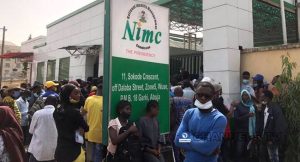R
Richard Ogunsile
Guest

Telecom companies have begun to cut off around 66 million phone connections nationwide to enforce the directive from the federal government regarding the connection of the National Identification Number (NIN) to the Subscriber Identity Module (SIM).
Naija News reports that this step was taken following numerous extensions and cautions Nigerians to adhere to the policy aimed at enhancing national security and simplifying the identification process.
It’s important to note that as of March 2024, 153 million out of 219 million active mobile lines on networks such as MTN, Glo, Airtel, and 9mobile were already linked to the NIN, as reported by the Nigerian Communications Commission (NCC). This leaves approximately 66 million lines at risk of being disconnected.
Due to the issue of unverified NINs, there were brief interruptions in service across the country between July 28 and 29, causing widespread disruptions.
Financial records from the first half of 2024 indicate that MTN Nigeria and Airtel Africa blocked 13.5 million lines for failing to comply with the NIN-SIM connection rule.
MTN reported blocking 8.6 million lines, while Airtel claimed that 8.7 million of its customers had successfully verified their NINs.
Telecom companies, including MTN, Airtel, Glo, and 9mobile, have advised subscribers at risk of losing their service to connect their NIN to prevent permanent disconnection.
Subscribers whose services have been suspended still can reactivate them by visiting any of the telecom providers’ service centers or NIMC offices to finish the verification process.
The NCC issued the directive in partnership with the National Identity Management Commission (NIMC) requires all mobile phone users in Nigeria to link their SIM cards to their unique NIN.
This policy, introduced in 2020, was a part of the government’s strategy to reduce insecurity, fraud, and criminal activities enabled by unregistered or improperly registered phone lines.
After several postponements of the deadlines by the NCC since December 2023, the NCC announced in August that it anticipated that no SIM cards would be operational without a confirmed National Identification Number (NIN) by September 15.
A representative from the NCC confirmed the deactivation of lines, explaining that lines not in compliance would be prevented from making calls, sending text messages, or utilizing mobile data until they successfully complete the connection procedure.
“We will disconnect anyone who refuses to comply; the grace period is over. The reason why we extended the last time was the misconception of Nigerians who claimed that the NCC wanted to frustrate the August 1 protest,” the NCC representative told Leadership.
He defended the NIN-SIM linkage as crucial to national security, adding that the policy is intended to create a central database that can be used to track criminal activity, verify identity, and enhance digital financial inclusion.
“Unregistered and unlinked SIMs have been identified as tools frequently used in the perpetration of criminal activities such as kidnapping, terrorism, and financial fraud. The NIN-SIM linkage is an essential step in safeguarding the nation and ensuring the integrity of our telecom infrastructure,” he added.
Naija News reports that despite facing backlash, President Bola Tinubu’s administration has stood firm in its dedication to the policy, stating that those who do not follow it could potentially lose access to essential mobile services.
Recently, the president of the National Association of Telecommunications Subscribers, Adeolu Ogungbanjo, following visits to various telecommunications centers, expressed his dissatisfaction with the NIN-SIM registration process, describing it as terrible.
Ogungbanjo, therefore, pleaded for the NCC to consider pushing back the deadline due to the technological issues encountered during the registration process last week.
“I believe they should consider extending it for a week, and the NCC should be commended for these delays,” he remarked.
The post NIN-SIM Linkage: Telcos Begin Disconnection Of 66 Million Phone Lines In Nigeria appeared first on Naija News.
